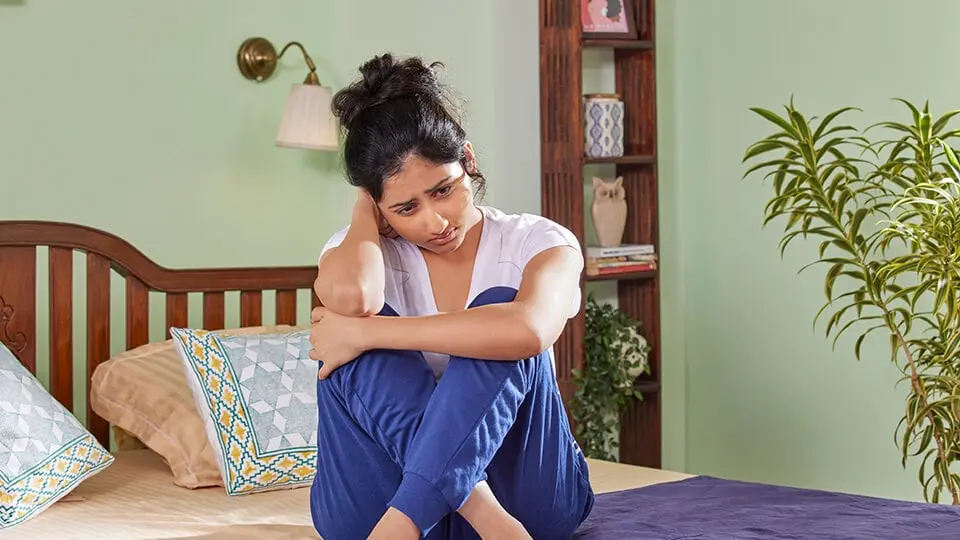What is PMS?
PMS or Premenstrual Syndrome is a set of physical, emotional and behavioral symptoms that occur during the latter part of the menstrual cycle of a woman, mostly around a week or two prior to the period.
Premenstrual symptoms are different for different women. Some women feel little to no discomfort apart from slightly tender breasts or a sweet craving during the days leading up to their periods. But many women experience several physical changes such as tender breasts, bloating, severe fatigue, and several behavioral and emotional changes such as extreme mood swings, irritability, and bouts of sadness.
Like periods, PMS is also a natural part of a woman’s menstrual cycle. PMS symptoms usually last for a few days and go away as soon as your periods start.
What are the symptoms of PMS?
Even though every woman experiences PMS differently, right from the PMS duration to its severity and symptoms, there are a set of common physical and emotional symptoms that have been attributed to PMS.
Physical signs and symptoms of PMS include but are not limited to bloating, PMS cramps, fatigue, joint pain, hunger pangs, acne, a disturbed sleep schedule etc. While the emotional symptoms can manifest themselves in the form of oversensitivity, extreme mood swings, anger, irritability, anxiety, depression, etc.
Just as PMS symptoms vary from woman to woman, their duration and severity can vary from cycle to cycle for the same woman. For some women, PMS symptoms are known to alleviate postpartum and aggravate as they age and approach menopause. This informative video on PMS can help you to better understand the symptoms of PMS.
Causes of PMS
Even though it is estimated that three out of four women experience PMS symptoms in some or the other form, the exact causes of PMS are unknown. This is mostly because of the wide range of symptoms experienced by different women which makes it difficult to arrive at a concrete diagnosis.
That being said, several studies suggest that PMS is mainly caused due changes in cyclic hormones during your menstrual cycle. The interaction between the hormones and serotonin, a chemical produced by the brain that is responsible for your mood states, is also considered to be a contributing factor.
A few other factors such as smoking, stress, alcohol consumption, sleep deprivation, depression etc., are also known to affect PMS and its severity, however, they do not cause it.
How to Manage PMS?
Although PMS cannot be completely cured, there are several PMS treatments and home remedies that can help you manage your PMS symptoms. These are:
Exercise - Engaging in about 30 minutes of cardio exercises such as brisk walking, jogging, running, or swimming, at least 5 days every week can help in managing symptoms such as fatigue and prevent mood swings by generally elevating your mood. Apart from handling PMS, regular exercise will also help in improving your overall health.
Making dietary changes - Several dietary changes are known to provide PMS relief such as eating smaller meals frequently and a reduction in salt intake can ease bloating and fluid retention. Eating a balanced diet that includes healthy foods such as whole grains, green leafy vegetables, fresh fruits, and bowls of salad can benefit you by not only relieving the symptoms of PMS but also helping you maintain a healthy weight. Incorporate calcium rich foods such as dairy, plenty of nuts and green leafy vegetables to your diet. If you are lactose intolerant or are allergic to nuts, try adding a calcium supplement to your routine.
Managing stress - Getting adequate sleep by regularizing your sleep schedule can help in managing stress. Practicing deep relaxation techniques such as yoga, deep breathing etc., can also help in alleviating insomnia and stress. It is especially useful for women who experience severe migraine headaches.
Avoid smoking - Several studies have shown that women who smoke cigarettes reported that they experienced worse, more severe PMS symptoms than women who avoid smoking altogether.
Incorporating health supplements – Supplements such as such as iron, folic acid, vitamin B-6, vitamin D and magnesium can help in managing cramps and reducing mood swings.
Avoid alcohol and caffeine - Reducing your alcohol and caffeine intake can also help in managing your PMS symptoms effectively.
When to see a doctor?
As a general rule, it is best you paid a visit to your gynecologist if:
The PMS symptoms begin to interfere with your daily life, causing issues at work or affecting your interpersonal relationships.
You have tried home remedies such as lifestyle changes and stress management techniques but to no avail.
If you have recurring symptoms of PMS that are severe enough to affect your daily routine, prior to your periods, for over three months.
Deciding when to visit your doctor can prove to be slightly tricky since the symptoms of PMS are largely similar to the early symptoms of pregnancy and other disorders. An effective tool that can help here is maintaining a menstrual record. Simply document the symptoms over a few months and check for any anomalies. For example, if the symptoms consistently occur prior to your periods and vanish as you begin to menstruate, then the symptoms indicate PMS.
However, if the symptoms are erratic and follow no particular pattern, there can be another underlying cause that can only be diagnosed by a health care professional.
Your gynecologist may ask you questions relating to the symptoms, your menstrual cycle, your overall health and whether you are on any other medications (to rule out the possibility of a possible side-effect) and they may also prescribe some blood work.
Based on the diagnosis, they can then prescribe a suitable course of medication to ease your symptoms.
Key Takeaway
PMS is as normal and as natural as your periods. Most PMS symptoms can be treated using home remedies and incorporating lifestyle changes and are not a cause for alarm. If you are suffering from severe symptoms, it is best to consult your health care professional.




